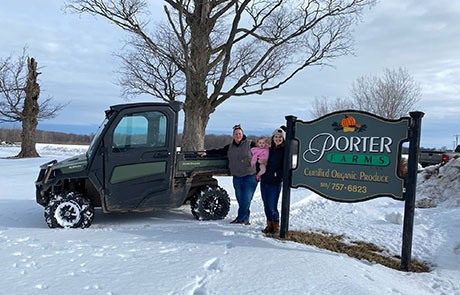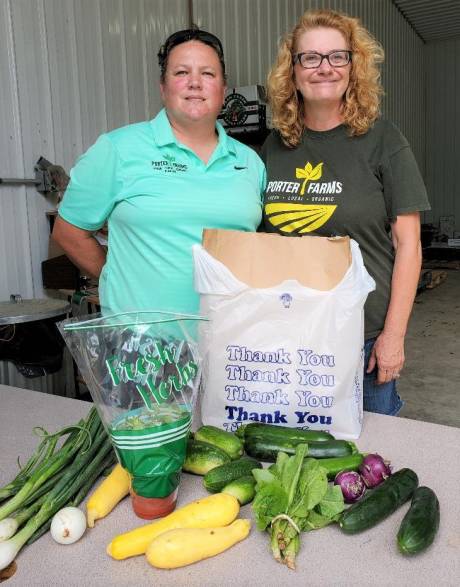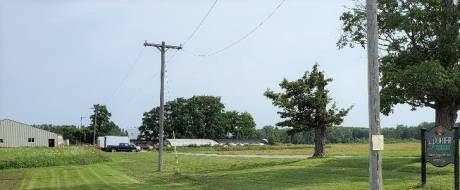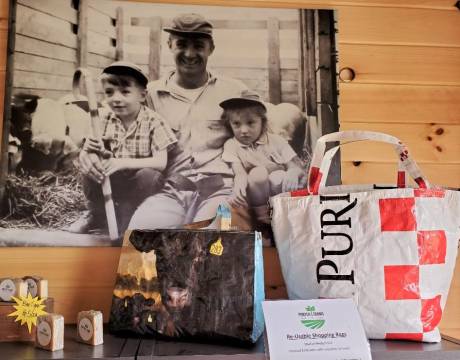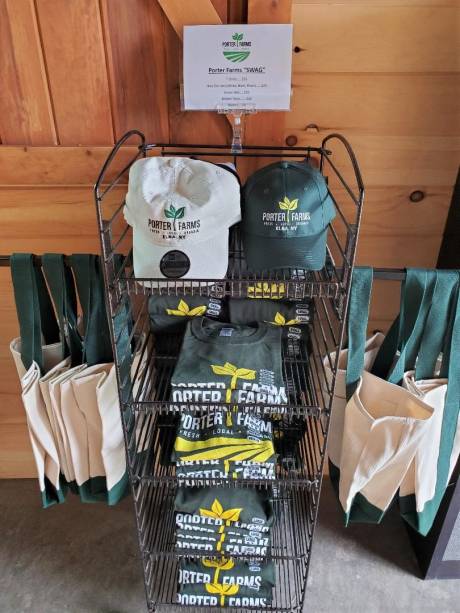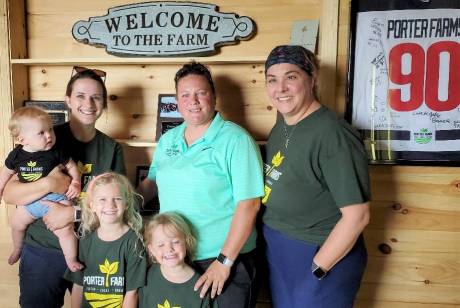The day-to-day operations manager at Porter Farms in the Town of Elba is determined to make all of Western New York aware of the substantial benefits of local farm markets and Community Supported Agriculture programs.
“I think that we all know that after COVID, we can’t rely on big box stores for everything that we need,” Kathy Riggs-Allen, a longtime Elba resident said today at the retail store and CSA processing site at 4911 Edgerton Road.
“You’ve got something like this right in your backyard. Whether it’s us, or Torrey’s Farm Market on (Route) 98 and Underhill's in Elba or Harrington’s in Batavia. You have these awesome things right in our area.”
Today was CSA pickup day at Porter Farms, which, for 25 years, has forged relationships with consumers who support the farm by purchasing memberships and, in return, receiving a bag of produce each week during the 22-week or so growing season.
According to the United States Department of Agriculture’s National Agriculture Library, CSA consists of a community of individuals who pledge support to a farm operation so that the farmland becomes, either legally or spiritually, the community's farm -- with the growers and consumers providing mutual support and sharing the risks and benefits of food production.
Per the USDA, through these memberships the farmer receives advance working capital, gains financial security, earns better crop prices, and benefits from the direct marketing plan.
Riggs-Allen reported that membership in the CSA at Porter Farms currently is at approximately 450 members, with around 250 from the Buffalo area, 100 from the Rochester area and another 100 local residents.
She said that a full share costs around $20 a week while a half share (a little more than half of what is in the bag for a full share) costs around $15 a week, with memberships paid in advance.
All of the produce in the bag is organic, grown on the more than 500 acres owned by the Porter family.
“Every Saturday morning, we bag and retrieve produce for our members,” Riggs-Allen said. “For the Buffalo area members, we have divided them into about 17 different groups – with letters on the wall that indicate the (street or town) location. If there’s 13 people in your group, you take turns and you can drive out here – usually twice a season – and pick up the bags for everyone in that group. From there, you would take it to a pickup site where everyone in that group would come to that pickup site to get their bag.”
The Rochester area members are divided into five pickup sites, she said.
“For them, we load a truck first thing every Saturday morning, and the truck drops off the produce at those five sites, and the people in those groups go to their sites to pick up,” she explained. “Anybody can come to the farm and pick their share up. If you want to come every week, that’s great. If you don’t, you can be assigned to a group.”
Riggs-Allen said the farm is looking to grow the CSA, which at one time had more than 1,000 members.
She said samples of the vegetables that are being picked that particular week are available at the retail store.
This week’s bag contains potted oregano, white onions, baby romaine lettuce, cucumbers, pickling cucumbers, yellow squash, zucchini and purple kohlrabi (the name kohlrabi is German for “cabbage turnip”).
Ruth Miller, of West Barre, part of a family of retired dairy farmers, said she has been a CSA member for five years and appreciates “the food and the fellowship.”
“(I support) the idea of group, community farming. We’re farmers as well, so we understand the business and kudos to these people who are doing this,” she said, adding that the fact that the vegetables are organic is important.
“There’s a process that farms have to go through to be certified organic – and it is quite a process. No use of chemicals or contaminated seeds. No herbicides or pesticides,” she noted.
Riggs-Allen said another key factor in the organic process for vegetables is crop rotation.
“We can’t fertilize and put nutrients back into the soil with fertilizers so we have to use additional crops that put those nutrients back in,” she advised. “Crops such as beans and peas take a lot of nitrates out of the ground, so wherever you plant those one year, you want to be put a cover crop that’s going to repopulate those nitrates into the ground.”
Elba resident Bill Kauffman, a 20-year CSA member, said the program has given him a new appreciation of produce.
“I was somewhat vegetable averse,” he said, but over time he indicated that he has grown to love zucchini.
“I’m the world’s worst baker, but last night I made zucchini cake – and it was edible. This has expanded my vegetable horizons, but there still are certain ‘no go’ areas like kohlrabi,” he joked.
Kauffman added that the Porters “are a wonderful family and they have created something beautiful and enduring here; I’m happy to be a little part of it.”
The family also owns a certified organic orchard of Asian pears and apples on Route 262 and rents additional farmland in the area.
Vegetables grown include tomatoes, peppers, eggplant, cucumber, Swiss chard, broccoli, cauliflower, varieties of lettuce, onion, leek, winter squash, beets, peas and other greens.
At the recently opened retail store, the Porters sell all-natural Angus ground beef and lamb, produced from the livestock raised on their farm, as well as herbs, local honey and syrup, baked goods and other items.
The farm was started in 1956 by the late Carlton “Jack” Porter Jr. and carried on by his sons, Steve and Mike, who also have passed away.
Currently, Debbie Porter owns the farm, with Katie Porter-Metzler and Emily Porter-Swarner as key contributors to the operation and CSA program.
The retail store is open from 9 a.m. to 3 p.m. on Wednesdays and Saturdays. An open house, featuring activities for families, is scheduled for 11 a.m. to 1 p.m. on Aug. 7.
Photo at top: Kathy Riggs-Allen and Emily Porter-Swarner display the contents of this week's CSA bag of produce at Porter Farms in Elba; photos at bottom: Porter Farms location on Edgerton Road; picture at the retail store of founder Jack Porter with children, Mike and Beatrice "Bess"; hats, T-shirts and tote bags for sale at the store; Katie Porter-Metzler with children Georgia, Cora and Suzanna; Riggs-Allen, and Debbie Porter. Photos by Mike Pettinella.
